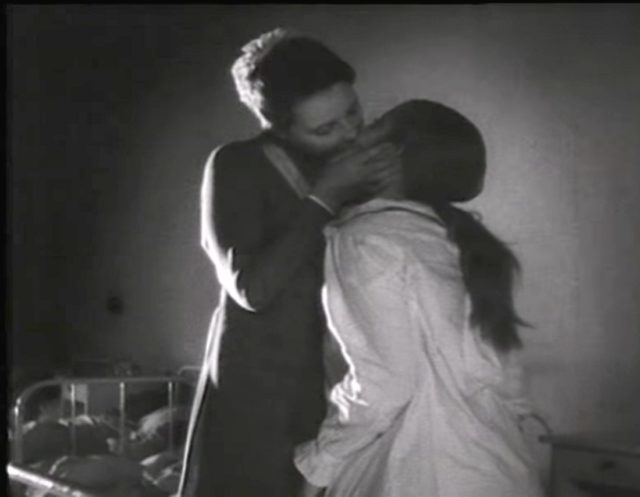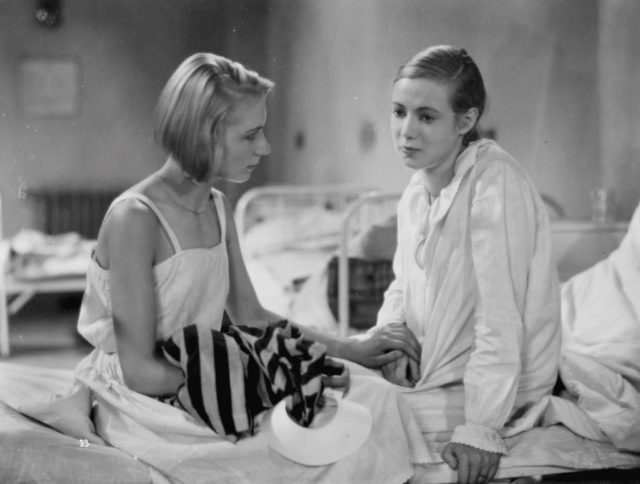I have a confession to make: before starting this column, I had only seen about 2 classic lesbian films. I know, I’m a bad queer. When I admitted this to my fellow GO coworkers, they were appalled. Two of them quickly listed off at least 10 films I needed to watch right away. I rapidly wrote down the titles (for research, obviously).
I want to take you all along with me in my quest to review all of the lesbian classics through my Millennial queer lens. Last week, I reviewed the coming of age film “Pariah.”
This week, I watched the first ever lesbian film made in Germany in 1931.

Last night, it was bitterly cold in Brooklyn. I got home from work and cuddled up with my dog to watch a lesbian classic. I didn’t know what film to choose from (my list is long as I haven’t seen so many amazing queer films). And that’s when I thought, why not go back to where it all began? The very first lesbian film was made in 1931 Germany. I’d heard of the film before but couldn’t believe that it was made in 1931, so I knew I had to watch it for myself.
“Mädchen in Uniform” translates in English to “Girls in Uniform” and the film has been made multiple times. I decided to stick with the original, which is based off of the 1930 play “Gestern und heute” (Yesterday and Today) by Christa Winsloe which supposedly has a much stronger lesbian plot-line than the film I watched.
As the snow started to fall, I poured myself an eggnog whiskey and snuggled up for this pivotal lesbian film. The story takes place in 1910 Prussia, with the lead character Manuela von Meinhardis transitioning into a brand new boarding school after the death of her mother. This was a time when discipline and rules was a standard at this school.
Manuela found her new home to be cold, harsh, and lacking in compassion. But soon after becoming acclimated to this new environment, she found solace in her peers. Most of the girls at the boarding school are around 14-years-old and even though this film was made in 1931 — it shows that the teen experience is relatable through the decades.
The girls bond as they brush each others’ hair, complain about the dismal uniforms, joke around before bed, and talk about their unified crush on teacher Fräulein von Bernburg. This is brought up in the most blasé of ways — like it’s totally normal to have same-sex attraction (which of course it is, but this portrayal was shocking for a film made in 1931). However, Manuela finds her crush on Bernburg to grow in intensity more so than her peers. And the pivotal “lesbian moment” in the film happens when Bernberg goes around kissing each of the girls goodnight on their foreheads, and when she gets around to Manuela she plants one on her lips. Manuela dramatically falls into her arms and you can see, in that instant, the young girl is infatuated with this older woman.

I wonder if this is where the stereotypical student/teacher lesbian romance storyline came from — or if there were books predating this that set the stage. Either way, this was a risqué and transgressive film to be released in 1931 — especially in pre-Nazi Germany right before Hitler took power and WWII began.
As the film continues, you get to experience Manuela’s first love and all of the intense and dramatic feelings that come with the experience. And while they never mention queerness or even the word lesbian — there are undertones of Manuela’s coming out process and Bernburg’s understanding of the young girls’ experience. “What you call sins, I call the great spirit of love, in all its forms,” Bernburg says.
While at first, I was definitely nervous about this romantic crush between Manuela and her (much) older teacher being weird or creepy — the way Bernburg maneuvered the situation was actually very kind. She knew that Manuela had feelings for her and she gently and compassionately talked to the teen about her feelings. It seemed to me that Bernburg was a lesbian herself and wanted to help Manuela as she processed her feelings, all while making sure nothing *actually* happened (besides the goodnight kiss). I think that Manuela was seeking affirmation and love from Bernburg in part because she just lost her mother and Bernburg was a kind and nurturing woman to her.
The climax happens when Manuela and her peers are celebrating after they just put on a play for the headmistress and her friends. The girls are drinking a boozy punch and getting tipsy together while dancing, cheering and laughing. Manuela decides to make a proclamation of her love for Bernburg and let the girls know that she thinks it might be requited by Bernburg. Just as she is shouting this out for her peers to know — the headmistress walks in. Manuela is swiftly punished and sent to a solitary corridor.
When she wakes, she tells the nurse “I can’t even think straight.” I chuckled to myself, wondering if that was a sneaky way to let the audience know she was coming out.

As the film comes to a close, you watch Manuela prepare to throw herself off of the stairwell in fear of isolation from her peers and in fear of never seeing Bernburg again. While Bernburg is getting scolded by the headmistresses, she has a telepathic moment with Manuela — which is like the gayest thing ever…and so romantic. I’m pretty sure we’ve all felt that connection with someone we’ve loved. Manuela is rescued by her peers who then protest against the headmistress by showing her how unjust she’s treating them all. It’s a powerful ending and statement to be made.
Fraulein von Bernburg: You must come to your senses. You must recover, whatever it takes.
Manuela: Recover? From what?
Fraulein von Bernburg: You’re not allowed to love me… so much.
In 1932, the New York Times reviewed the film and said: “It is actually more of a rap on the knuckles for the militaristic notions than an exposition of unnatural affection.”
Which is true. The film made subtle but strong messages of progress and compassion and feminine power. The film has only women actresses and was written by Christa Winsloe, directed by Leontine Sagan with artistic direction from Carl Froelich, who also funded the film. Froelich was the only man involved in the production of this film. That is something that rarely happens in Hollywood today.
This film holds historical importance for so many reasons — it is the first display of lesbian affection on the big screen. It normalizes same-sex attraction and delves into the emotions behind a first love. The snow was starting pile up in my backyard as I shut my laptop — and I found myself feeling a strong sense of appreciation for the history of my community and the women, queers, trans and nonbinary folks who have pushed society forward towards love and compassion for our nuanced experiences.
Corinne Kai is the Managing Editor and resident sex educator at GO Magazine. You can listen to her podcast Femme, Collectively just stalk her on Instagram.

What Do You Think?